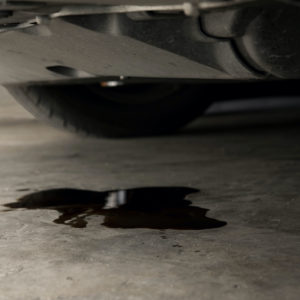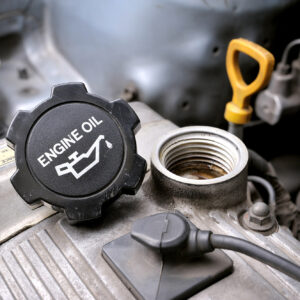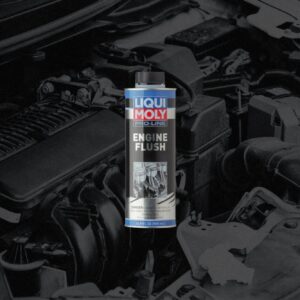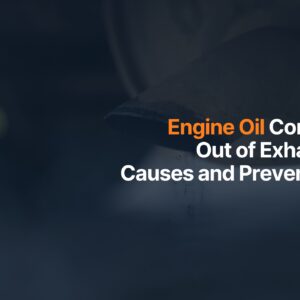Rod knocks refer to an engine’s rhythmic thumping sounds as the engine is running. This banging noise is created by too much bearing clearance due to wear. On every firing stroke on that cylinder, you’ll hear a knock as the clearance allows the loose bearing to strike the crankshaft journal for that rod.
Here’s a video of a rod knock:
Is Rod Knock Dangerous?
Yes, rod knock is dangerous. If your vehicle exhibits engine knocking, it’s time for some very expensive repairs or perhaps a used engine to replace the one that’s knocking.
What Causes Rod Knock?
It’s arguable that the most common cause for rod knock in engines is worn rod bearings, however, this problem can also be caused by insufficient engine oil. Contaminated engine oil is another major factor that leads to rod knock.
Worn Rod Bearings
One of the most common causes of rod knocking is worn connecting rod bearings. When these bearings are misshapen or damaged, the connecting rod becomes loose. This makes them rattle and bang against the crankshaft.
Insufficient Engine Oil
Engine oil plays a crucial role in your vehicle’s engine by helping different components move. The oil lubricates all moving parts, including the rod bearings. If there isn’t enough engine oil in the vehicle, rod bearings and other moving parts dry out and get worn down by friction.
But once the engine starts knocking when you run it low on engine oil, it’s too late. That’s what happened to the engine in the video. Here’s another video of an engine knock due to running the engine low on oil:
Contaminated Engine Oil
If you don’t change your vehicle’s engine oil often enough, it might get contaminated by water, metal particles, and other unwanted substances. Contaminated engine oil doesn’t just lead to rod knock – it can also lead to other engine complications that might lead to serious (and permanent) damage.
Issues Commonly Confused with Rod Knock
Strange engine noises aren’t always caused by worn rod bearings. Issues like failing belt tensioners, chunks missing from V-belts, malfunctioning knock sensors, and engine detonations may be mistaken for rod knock. A rod knock will be very rhythmic, as you’ve seen in the videos.
Here’s a video of a Nissan Altima that was knocking:
A rod knock will be very rhythmic.
– Richard McCuistian, ASE Certified Master Automobile Technician
Bad Tensioner Belts
Though bad tensioner belts and pulleys don’t cause rod knock, these components can produce rattling noises in the engine. If you hear knocking from inside your engine, inspecting it or consulting a mechanic before attempting any fixes is a good idea.
Knock Sensor Malfunction
If your vehicle’s knock sensor malfunctions, it might struggle to determine whether or not fuel is being burned fully. Improper combustion can cause vibration and knocking noises inside the engine. These noises can easily be mistaken for rod knocks.
Engine Detonations
Engine detonations can easily be mistaken for rod knock sounds to a person who has never heard an actual rod knock. These detonations are often caused by engines that run lean, which means there isn’t enough fuel and too much air in the combustion chamber. Detonation knocks sound identical to rod knocks.
How to Fix Rod Knock: DIY or Hire a Mechanic?
Since repairing or replacing engine components is a delicate affair, it’s best to leave such procedures to trained mechanics.
A professional will be more equipped to inspect each rod and its respective bearings before draining the oil and checking the oil pan. If there are any shiny bits in the oil, there’s a good chance they’re from the damaged rod bearings.
The mechanic will then inspect other components affected by rod knock, such as the crankshaft and the fuel injection system, and make the necessary replacements. You can expect to spend between $2,000 and $7,000 to fix rod knock.
How to Get Brand-New Rod Bearings
Rod knock isn’t an issue that’ll go away on its own. You’ll have to replace the worn rod bearings causing it, or you risk damaging your engine further. In some cases, rod knock can even lead to complete engine failure, which is something that can be a lot more pricey to fix. Thankfully, you can avoid paying expensive repair fees by getting replacement rod bearings from CarParts.com today.
Whether you’re working within a budget or looking to splurge, you’re sure to find brand-new rod bearings that fit your preferences at CarParts.com. Enjoy a worry-free shopping experience from start to finish, thanks to our built-in vehicle selector and secure checkout page. Our lifetime replacement guarantee policy means you can return your used rod bearings and apply for a replacement down the line. Send our customer support staff a message, and they’ll be right with you to help you out.
Don’t let your vehicle’s rod knock get worse before replacing its worn rod bearings. Browse through our selection of high-quality rod bearings and get one for your vehicle today!
Any information provided on this Website is for informational purposes only and is not intended to replace consultation with a professional mechanic. The accuracy and timeliness of the information may change from the time of publication.

































